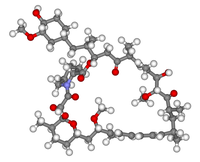
Photo from wikipedia
Aspergillus fumigatus G-13 has a strong potential to degrade lignocellulose. The study identified the secreted proteins of natural lignocellulosic substrates fermented by Aspergillus fumigatus G-13 by iTRAQ, and performed bioinformatics… Click to show full abstract
Aspergillus fumigatus G-13 has a strong potential to degrade lignocellulose. The study identified the secreted proteins of natural lignocellulosic substrates fermented by Aspergillus fumigatus G-13 by iTRAQ, and performed bioinformatics analysis on the differential proteins obtained. The effects of pretreatment on the production of ligninase and the degradation of natural lignocellulose by strains were studied. The results showed that with Robinia as fermentation substrate, 897 differential proteins were found before and after pretreatment, and the expression was up-regulated by 432 and the expression was down-regulated by 465. Using walnut shell as fermentation substrate, there were 1122 differential proteins, with 802 expressions up-regulated and 20 expressions down-regulated. The Gene Ontology (GO) suggested that these differential proteins were mainly involved in transport activity, catalytic activity and enzyme regulation activity. The pretreated natural lignocellulosic substrate was fermented by Aspergillus fumigatus G-13, exhibited high lignin-degrading enzyme activity and high protein expression. It is shown that pretreatment affects the metabolic pathways of the fungi cells, increases the production of key enzymes, such as NADH-ubiquinone oxidoreductase, hyphae catalase CAT1, flavin-binding monooxygenase, urinary acid-1,2-dioxygenase, catechol dioxygenase, glyoxalase, FDA monooxygenase, fatty acid oxygenase, etc. Simultaneous pretreatment increases the methyl metabolism capacity of the strain and stimulates the growth of the mycelium cells.
Journal Title: Polish Journal of Environmental Studies
Year Published: 2020
Link to full text (if available)
Share on Social Media: Sign Up to like & get
recommendations!